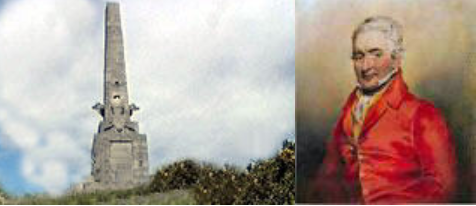
CAPTAIN MACGREGOR SKINNER was born in Perth-Amboy in North America in 1760.He joined the Royal Navy in 1776 and was an officer on the HMS Phoenix during the American War of Independence.He only served a short time before he lost his arm and received many bad wounds storming Forts Lee and Washington.He lost an eye in combat, and served with the Navy until 1793 when he entered the Post Office shipping service.He was well loved and respected by the people of Holyhead.Captain Skinner became Master of the Paddle Steamers “Escape”, “Wizard” and “Dragon”, and was usually accompanied by his raven who would recognise the”Escape” and fly out until it was perched on his Masters’ shoulders! In 1832 be became the principal witness of a Committee drawn up by Parliament to look into the fact that Holyhead should have been grown in prosperity due to great sums of money being spent on roads – but with the cramped accommodation on the boats, people were opting to go to Ireland from the port of Liverpool. Captain Skinner was to investigate this. He reported that high fares and bad accommodation were turning passengers away from Holyhead, together with the report that the Holyhead packets had only iron knives and forks and earthenware, compared to their rival packet ships in Liverpool who could boast being magnificently fitted and provided plates, table linen, mattresses, feather beds and an abundance of blankets. Sir Henry Parnell corroborated Captain Skinner’s evidence and concluded that the Admiralty take over management of the packets from the Post Office. The Committee made a statement that the Holyhead route was a major one,and that no expense should be spared on it.The evidence was vindicated in October 1832. On the 13th October 1832, when the Escape was approaching Holyhead,the bulwark on the starboard side was smashed by heavy seas, and tragically washed Captain Skinner and his mate through the port bulwark. Their bodies were not recovered for some weeks. When Captain Skinner’s body was discovered, it gave reason to suppose that it had been found some time before, when valuables had been removed before casting him back into the sea. He was 70 years old, and had been in public service for 59 years. So much and so sincere was the grief in the town of Holyhead, at the tragic loss of Captain Skinner, that an obelisk to his memory was erected by public subscription on a dominating crag of rock overlooking Holyhead harbour It bears the words:- “This monument was erected by his numerous friends to the memory of John Macgregor Skinner, R.N., and for 33 years captain of one of the post office packets on this station,in testimony of his virtues, and their affectionate remembrance of him in his public capacity. He was distinguished for zeal, intrepidity and fidelity. In private life he was a model of unvarying friendship, disinterested kindness and unbounded charity.MDCCCXXXII.” It was revealed that Captain Skinner had died because of the neglect of the Post Office, who were impervious to any lesson and incapable of grasping the needs of the time. Sea Service did not improve, and nothing was done to introduce modern paddle steamers on the Holyhead route and just the opposite was true of the land service. An inquiry was held in 1836 due to the blatant mismanagement of the Post Office ships,and it revealed a loss in every station but a particularly great one in Holyhead. At last a decision was finally made to transfer the packets to the Board of admiralty and in 1837 the six Holyhead Packets were transferred and renamed Zephyr, Doterel, Otter, Sprightly, Cuckoo and the Gleanor.
